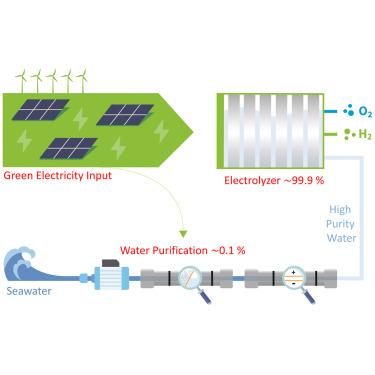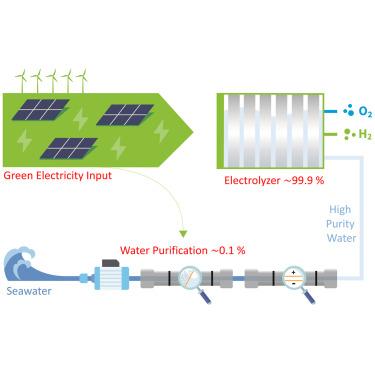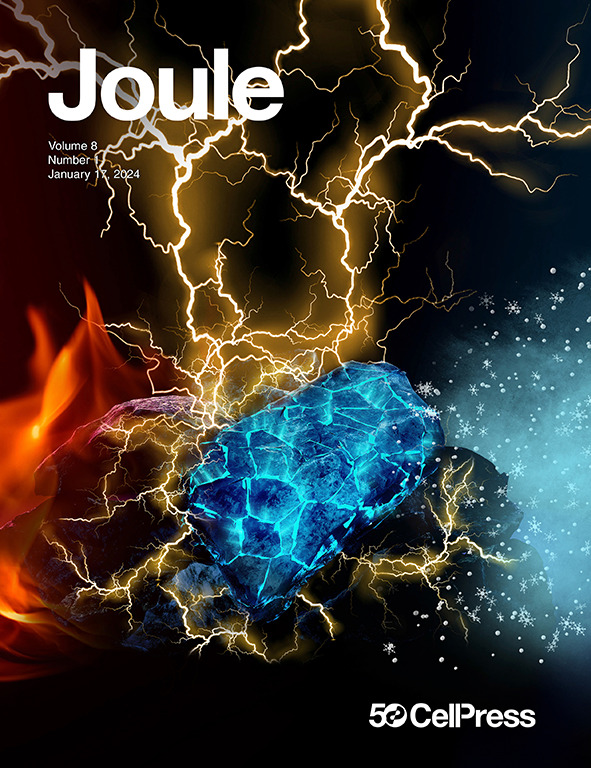炒作直接电解海水阻碍了电解槽的开发
摘要
扬-尼克拉斯-豪斯曼(Jan Niklas Hausmann)于 2022 年完成博士学位,目前是柏林亥姆霍兹中心 CatLab 的博士后,师从普拉尚特-梅内泽斯(Prashanth W. Menezes)。他是一名训练有素的无机化学家,研究重点是开发用于传统和混合水分离的电催化剂和结构-活性关系。Lea R. Winter 是耶鲁大学化学与环境工程系助理教授。她于 2020 年获得哥伦比亚大学化学工程博士学位。2020-2022 年,她作为纳米技术水处理(NEWT)杰出博士后研究员在耶鲁大学接受了博士后培训。她的研究重点是食品、能源、水和气候之间的电气化过程,包括开发将二氧化碳转化为化学品和燃料的可持续和循环过程,将绿色固氮转化为肥料和氮基燃料,以及将废水中的污染物转化为有用的产品,同时回收适合用途的水。他的研究旨在通过开发支持氢气和电力等零排放能源载体的创新技术,为可持续发展的未来做出贡献。汗博士的研究方法综合了技术经济分析和生命周期分析,对能源系统和净零过渡途径进行建模。他目前的贡献包括推动可持续燃料和化学品的生产,影响钢铁生产和重型运输等领域。他撰写/合作撰写了 46 篇科学论文和 4 份政府报告,拥有 6 项已获授权的美国专利。他的研究兴趣包括水与能源之间的新兴膜技术、下一代海水淡化和水净化膜材料以及纳米材料的环境应用。Elimelech 教授是 Clarivate Analytics(前汤森路透)的高引用率研究员。他是美国国家工程院院士,也是中国工程院、澳大利亚技术与工程院和加拿大工程院的外籍院士。他是卡尔加里大学多家衍生公司的共同创始人和首席技术官,其中包括 O-Two Carbon 公司、CarboMat 公司和 NetZero Hub 公司。Kibria 在电化学系统方面拥有丰富的专业知识,包括水电解和二氧化碳电解以及电化学氧化反应。此外,他还对工艺建模和系统级分析(包括技术经济和生命周期分析)感兴趣,最近发表了一篇题为 "海水电解制氢:托比亚斯-松特海默(Tobias Sontheimer)是柏林亥姆霍兹中心能源与信息战略部的负责人,15 年来一直致力于帮助能源行业转型。目前,他负责绿色氢能技术和可持续航空燃料的研发工作。2014年至2020年,他曾担任亥姆霍兹协会国家能源研发组合的首席研究经理。桑特海默曾在亚琛工业大学和哈佛大学攻读物理学,并作为肖特股份公司奖学金获得者完成了可再生能源技术领域的博士学位。普拉桑特-梅内泽斯(Prashanth W. Menezes)是柏林亥姆霍兹中心CatLab薄膜催化材料化学组组长,并领导柏林工业大学无机材料组。他在德累斯顿马克斯-普朗克固体化学物理研究所获得博士学位,随后转入慕尼黑工业大学,后又转入柏林工业大学从事能源催化研究。他的研究重点是异相催化中新型功能前催化剂的设计、开发和动态结构理解,尤其是在氧化还原氧催化、(光)电催化水分离和电化学氧化还原反应中的应用。


Jan Niklas Hausmann finished his PhD in 2022 and is currently a postdoc at the CatLab of the Helmholtz-Zentrum Berlin in the group of Prashanth W. Menezes. He is a trained inorganic chemist, and his research focuses on the development of electrocatalysts and structure-activity relations for conventional and hybrid water splitting. Furthermore, he is interested in the techno-economics of these electrocatalytic processes and has recently published an article titled “Is direct seawater splitting economically meaningful?”
Lea R. Winter is an assistant professor in the Department of Chemical and Environmental Engineering at Yale University. She received a PhD in chemical engineering from Columbia University in 2020. She obtained postdoctoral training as a Nanotechnology Enabled Water Treatment (NEWT) Distinguished Postdoctoral Fellow at Yale in 2020–2022. Her research focuses on electrified processes at the food, energy, water, and climate nexus, including development of sustainable and circularized processes for conversion of CO2 to chemicals and fuels, green nitrogen fixation to fertilizers and nitrogen-based fuels, and transformation of contaminants in wastewater into useful products while recovering fit-for-purpose water.
M.A. Khan is an assistant professor in the Chemical and Materials Engineering department at the University of Alberta. His research aims to contribute to a sustainable future through the development of innovative technologies that support zero-emission energy carriers like hydrogen and electricity. Dr. Khan’s approach integrates techno-economic analysis and life cycle analysis to model energy systems and net-zero transition pathways. His current contributions include advancements in the production of sustainable fuels and chemicals, impacting areas such as steel production and heavy-duty transportation. He has authored/coauthored 46 scientific articles and 4 government reports and has 6 granted US patents.
Menachem Elimelech is the Sterling Professor of Chemical and Environmental Engineering at Yale University. His research interests include emerging membrane-based technologies at the water-energy nexus, materials for next-generation desalination and water purification membranes, and environmental applications of nanomaterials. Professor Elimelech is a Clarivate Analytics (formerly Thomson Reuters) Highly Cited Researcher. He is a member of the United States National Academy of Engineering and a foreign member of the Chinese Academy of Engineering, the Australian Academy of Technology and Engineering, and the Canadian Academy of Engineering.
Md Golam Kibria is an associate professor at the Department of Chemical and Petroleum Engineering at the University of Calgary. He is the cofounder and CTO of several spin-off companies from the University of Calgary, including O-Two Carbon Inc., CarboMat Inc., and NetZero Hub Inc. Kibria has extensive expertise in electrochemical systems, including water electrolysis and CO2 electrolysis as well as electrochemical oxidation reactions. Furthermore, he is interested in process modeling and system-level analysis, including techno-economic and life cycle analysis, and has recently published an article titled “Seawater electrolysis for hydrogen production: A solution looking for a problem?”
Tobias Sontheimer heads the Strategy Department for Energy and Information at the Helmholtz-Zentrum Berlin and has been helping to shape the transformation of the energy sector for more than 15 years. In his current role, he is responsible for research and development for green hydrogen technologies and sustainable aviation fuels. From 2014 to 2020, he was chief research manager for the Helmholtz Association’s national energy R&D portfolio. Sontheimer studied physics at RWTH Aachen University and Harvard University and completed his doctorate in the field of renewable energy technologies as a scholarship holder of SCHOTT AG.
Prashanth W. Menezes is head of the Materials Chemistry Group for Thin-Film Catalysis at the CatLab of the Helmholtz-Zentrum Berlin and leads the Inorganic Materials Group at Technische Universität Berlin. He received his PhD from the Max Planck Institute for Chemical Physics of Solids in Dresden, after which he moved to Technische Universität München and then to Technische Universität Berlin to work on energy catalysis. His research focuses on the design, development, and dynamic structural understanding of novel functional precatalysts in heterogeneous catalysis, especially for applications in redox oxygen catalysis, (photo)electrocatalytic water splitting, and electrochemical redox reactions.

 求助内容:
求助内容: 应助结果提醒方式:
应助结果提醒方式:


